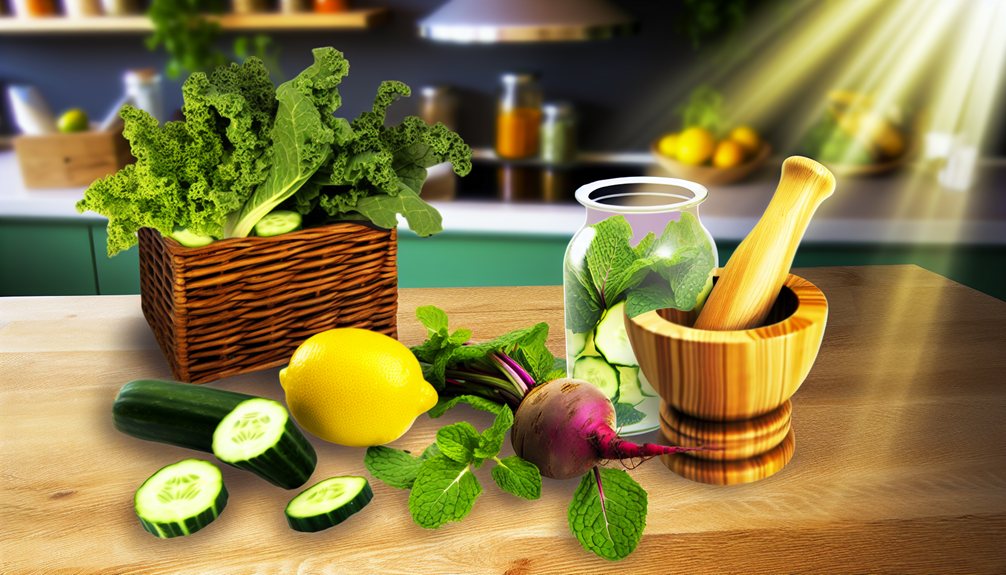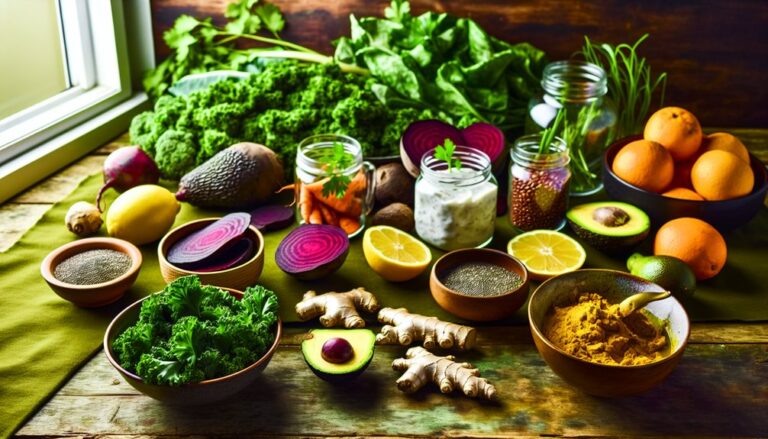
Did you know that about 25% of adults have some form of liver disease, often without even realizing it? If you’re concerned about your liver health, there are effective ways to detoxify at home that can make a significant difference. By incorporating specific foods and lifestyle changes, you can support your liver’s natural detox processes. But what exactly should you focus on, and what common habits might be unknowingly hindering your progress?
Listen to this Article Summary
Key Takeaways
- Stay hydrated by drinking at least eight 8-ounce glasses of water daily to support liver detoxification.
- Incorporate a balanced diet rich in whole foods, including leafy greens, cruciferous vegetables, and healthy fats.
- Limit exposure to toxins by choosing organic foods and using eco-friendly cleaning products to reduce chemical intake.
- Establish a regular exercise routine, aiming for at least 150 minutes of moderate activity each week to enhance liver health.
- Consult a healthcare professional before starting any detox regimen or herbal supplements to ensure safety and effectiveness.
Understand Liver Function
When it comes to your overall health, few organs play as significant a role as the liver. This remarkable organ acts as your body’s natural filter, processing toxins and waste products that arise from digestion, metabolism, and environmental exposure.
It’s responsible for breaking down fats, producing bile for digestion, and synthesizing proteins important for blood clotting and immune function. The liver also plays a critical role in regulating blood sugar levels. It stores glucose and releases it as needed, ensuring your body has a steady energy supply.
Additionally, it helps to metabolize medications and alcohol, rendering them less harmful and facilitating their excretion. Understanding liver function is essential for maintaining your health. If your liver’s functioning properly, you may not notice it, but when it’s overwhelmed, various health issues can arise. Regular exercise is vital for enhancing liver health and supporting its natural detoxification processes.
Signs of Liver Toxicity
You should be aware of the common symptoms that indicate liver toxicity, as these signs can greatly affect your overall health.

Fatigue, jaundice, and unexplained weight gain are just a few red flags to monitor.
Ignoring these symptoms can lead to long-term health risks, so it’s essential to recognize them early.
Common Symptoms to Watch
A healthy liver is essential for overall well-being, and recognizing the signs of liver toxicity can help you take proactive steps toward detoxification. If you notice any changes in your body, it might be time to pay attention.
Here are some common symptoms to watch for:
- Fatigue: Feeling unusually tired or fatigued can indicate that your liver is overworked.
- Jaundice: A yellowing of your skin or the whites of your eyes signals an issue with liver function.
- Digestive problems: Nausea, bloating, or changes in appetite can suggest that your liver isn’t processing foods effectively.
- Skin issues: Unexplained rashes or itching may point to liver toxicity affecting your body’s detoxification processes.
If you experience any of these symptoms, it’s vital to consult a healthcare professional. They can provide guidance tailored to your specific situation.
By staying vigilant and aware of these signs, you can take charge of your health and begin your journey toward a healthier liver.

Long-term Health Risks
Although liver toxicity can manifest through various symptoms, its long-term health risks are often more insidious and can lead to serious complications if left unaddressed. Chronic exposure to toxins can result in conditions like fatty liver disease, which may progress to cirrhosis and even liver cancer over time. You mightn’t notice any symptoms until the damage is significant, making early intervention essential.
Additionally, impaired liver function can disrupt your body’s ability to metabolize nutrients, leading to malnutrition or vitamin deficiencies. This can affect your overall health and energy levels. You’re also at higher risk for developing metabolic syndrome, which includes obesity, diabetes, and heart disease—all linked to liver health.
Ignoring liver toxicity can lead to systemic issues, as the liver plays a critical role in detoxifying the blood. Over time, toxins can accumulate and affect other organs, exacerbating health problems.
To protect your long-term health, it’s important to acknowledge any early signs of liver strain, like fatigue or digestive issues, and consider detoxifying methods. Taking proactive steps now can help mitigate these serious health risks and promote better liver function down the line.
Hydration and Its Importance
Proper hydration plays an indispensable role in liver health, often overlooked in detoxification discussions. Your liver needs adequate water to function effectively, as it helps flush out toxins and supports essential metabolic processes. When you’re dehydrated, your liver can’t perform these functions efficiently, leading to potential health issues.
Here’s why staying hydrated is important for your liver:

- Supports Detoxification: Water helps the liver break down and eliminate toxins more efficiently.
- Aids Digestion: Proper hydration promotes the production of bile, which is fundamental for digesting fats.
- Prevents Fatty Liver: Sufficient fluid intake can help reduce the risk of fatty deposits in the liver.
- Enhances Nutrient Absorption: Hydration assists in the absorption of nutrients, which the liver uses for various functions.
To stay hydrated, aim for at least eight 8-ounce glasses of water daily, adjusting based on your activity level and environment. Incorporating herbal teas or infused water can also make hydration more enjoyable.
Nutrient-Rich Foods to Include
Staying hydrated sets the stage for incorporating nutrient-rich foods that can further enhance your liver’s detoxification capabilities. Focus on foods high in antioxidants, vitamins, and minerals to support your liver’s health.
Leafy greens like spinach and kale are excellent choices, as they’re packed with chlorophyll, which helps filter toxins from the bloodstream.
Cruciferous vegetables, such as broccoli and Brussels sprouts, are also beneficial. They contain compounds that stimulate liver enzymes, aiding detoxification processes.
Don’t forget about beets; their high fiber and antioxidant content can help improve liver function.
Fruits like berries, citrus, and apples are rich in vitamins and antioxidants, promoting overall liver health.

Avocados are another great option, as they contain healthy fats and glutathione, essential for detoxification.
Incorporating nuts and seeds, especially walnuts and flaxseeds, provides omega-3 fatty acids and fiber, supporting liver function.
Whole grains such as quinoa and brown rice offer complex carbohydrates and essential nutrients.
Herbal Remedies for Liver Health
When it comes to supporting your liver health, herbal remedies like milk thistle and dandelion root can be incredibly beneficial.
Milk thistle is renowned for its ability to protect liver cells and promote regeneration, while dandelion root is often used to aid digestion and enhance bile production.
Incorporating these herbs into your routine could help you maintain ideal liver function.

Milk Thistle Benefits
Although many people overlook herbal remedies, milk thistle has gained attention for its impressive benefits in promoting liver health. This powerful herb contains silymarin, a compound known for its antioxidant and anti-inflammatory properties.
If you’re looking for ways to support your liver, incorporating milk thistle into your routine could be a game changer.
Here are some key benefits you might experience:
- Liver Protection: Silymarin helps shield liver cells from toxins and damage.
- Regeneration Support: It promotes the regeneration of liver cells, aiding recovery from liver-related issues.
- Detoxification Aid: Milk thistle enhances the liver’s ability to detoxify, making it easier for your body to eliminate harmful substances.
- Cholesterol Management: Some studies suggest that milk thistle can help maintain healthy cholesterol levels, contributing to overall cardiovascular health.
To enjoy these benefits, you can find milk thistle in various forms, including capsules, tinctures, and teas.
Remember to consult with a healthcare professional before starting any new supplement, especially if you have existing health conditions or are taking medications. Your liver will thank you!
Dandelion Root Uses
Exploring the benefits of dandelion root can be a valuable addition to your liver health regimen. This potent herb has been used for centuries in traditional medicine, largely due to its ability to support liver function and enhance detoxification processes.

Dandelion root is known for its diuretic properties, which can help eliminate toxins and excess fluid from your body. Moreover, studies suggest that dandelion root may promote bile production, essential for digesting fats and eliminating waste. Increased bile flow not only aids digestion but also plays a vital role in detoxifying your liver.
You can incorporate dandelion root into your routine by brewing it as a tea, taking it in tincture form, or using it as a supplement. Additionally, dandelion root contains antioxidants that protect liver cells from oxidative stress, potentially preventing liver damage.
This herb is rich in vitamins and minerals, further supporting overall liver health. However, it’s always wise to consult with a healthcare professional before starting any new herbal regimen, especially if you have existing health conditions or are taking medications.
Embracing dandelion root might just be the boost your liver needs!
Lifestyle Changes for Detoxification
Your liver plays an essential role in detoxifying your body, and making lifestyle changes can markedly enhance its function. Incorporating healthy habits into your daily routine can help support your liver’s natural detoxification processes.
Here are some simple yet effective lifestyle changes you can make:

- Stay Hydrated: Drinking plenty of water helps your liver flush out toxins and supports overall bodily functions. Aim for at least eight glasses a day.
- Eat a Balanced Diet: Focus on whole foods rich in antioxidants, such as fruits, vegetables, and whole grains. These foods can protect your liver and enhance its detox capabilities.
- Exercise Regularly: Physical activity boosts circulation and helps maintain a healthy weight, reducing the burden on your liver. Aim for at least 150 minutes of moderate exercise each week.
- Get Enough Sleep: Quality sleep is vital for your liver’s repair processes. Aim for 7-9 hours of uninterrupted sleep each night to give your liver the time it needs to detoxify effectively.
Avoiding Toxins in Daily Life
Making lifestyle changes is just the start; taking steps to avoid toxins in your daily life can further enhance your liver’s detoxification abilities. By being mindful of your environment and the products you use, you can greatly reduce the burden on your liver.
Consider the following common sources of toxins:
| Source of Toxins | Healthier Alternatives |
|---|---|
| Conventional cleaning products | Eco-friendly or homemade cleaners |
| Processed foods | Whole, organic foods |
| Synthetic fragrances | Essential oils or no fragrance |
Start by choosing natural cleaning products that won’t release harmful chemicals into your home. Opt for whole foods rather than processed options, as they contain fewer artificial additives. Additionally, be cautious with air fresheners and scented candles; they can emit volatile organic compounds that stress your liver.
You’ll find that small changes can make a big difference in how you feel. By reducing your exposure to toxins, you’re not only supporting your liver but also fostering overall well-being. Remember, your body deserves a clean environment to thrive!
Establishing a Detox Routine
When you’re ready to support your liver’s health, establishing a detox routine can be a game changer. A consistent approach helps your body flush out toxins and boosts overall wellness.
Here are some key steps to incorporate into your detox routine:

- Hydrate: Drink plenty of water to help your liver flush out toxins. Aim for at least 8-10 glasses a day.
- Eat Whole Foods: Focus on fruits, vegetables, and whole grains. Foods high in antioxidants, like berries and leafy greens, support liver function.
- Limit Alcohol and Sugar: Reducing your intake of alcohol and added sugars can relieve stress on your liver. Moderation is key.
- Incorporate Regular Exercise: Aim for at least 30 minutes of moderate exercise most days. Physical activity enhances circulation and promotes detoxification.
Conclusion
Just like a river flowing freely nourishes the land around it, a well-maintained liver supports your entire body’s health. By incorporating hydration, nutrient-rich foods, and mindful lifestyle changes, you can create a vibrant detox routine that revitalizes your liver and enhances your overall well-being. Embrace this journey to wellness, and watch how the positive changes ripple through every aspect of your life. Your liver deserves the care, and so do you.




